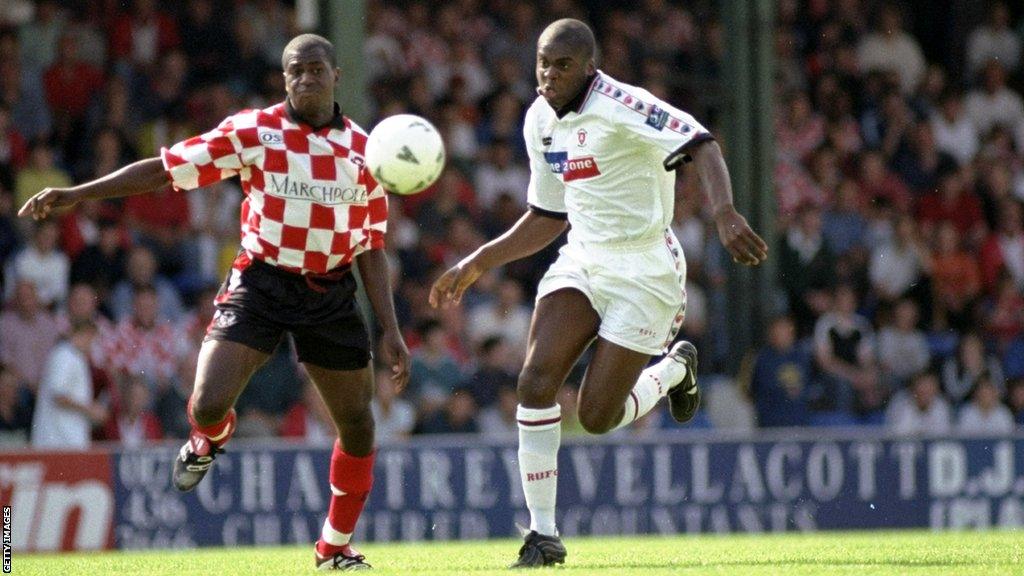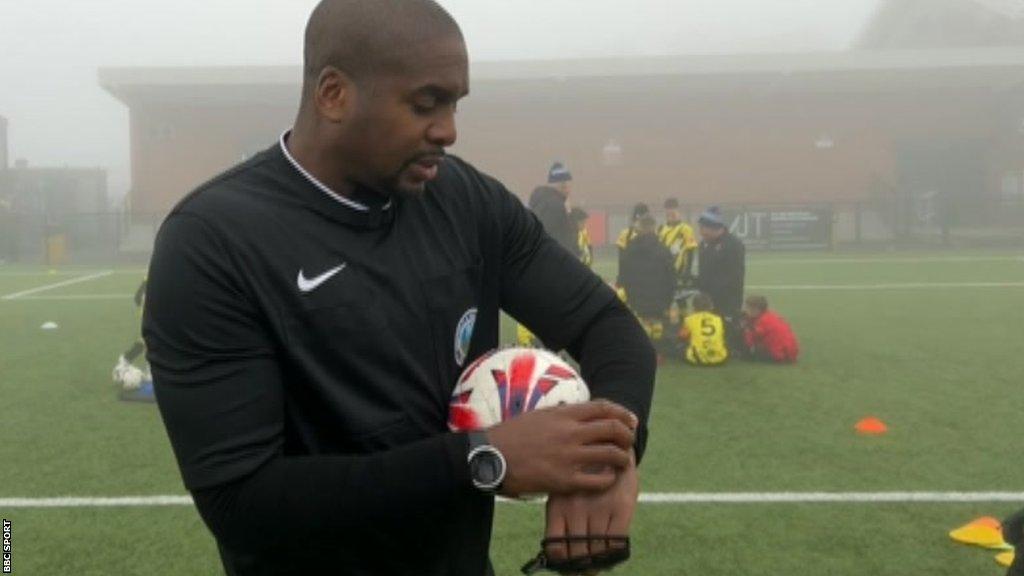Vance Warner: Former Nottingham Forest defender on how he is 'giving back' as a referee
- Published
'No-one grows up wanting to be a referee'
Vance Warner is a referee who relishes being put on the spot when asked what he knows about football.
As a former Premier League defender and England Under-18s international - who once roomed with David Beckham - the age-old challenge of authority is one he is adept at dealing with.
His playing career, which started with Nottingham Forest and ended at Rotherham United, is the very reason he became what he never thought he would be.
"I was asked if I wanted to become a referee to help with my son's team when he was about eight years old, and of course I said 'no' because who wants to be a referee? No-one grows up wanting to be a referee as far as I'm aware," 49-year-old Warner told BBC East Midlands Today.
"Then I thought, you know what? This is a perfect opportunity to give back to my son's club, and because I have played football, maybe I've got a little more credibility when they ask me 'well, what do you know about football, ref?' I can go, 'I can tell you a few stories'."
And for the past 13 years Warner has been refereeing at grassroots level in South Yorkshire and Nottinghamshire.
He has remained a Level Seven accredited official - or "basically entry level" as Warner calls it - the entire time, because it is overseeing junior games where he feels he can "contribute the most".
'I lived a lucky existence'
As someone who emerged as a Forest player while still living with his parents in The Meadows - an inner-city estate near the Reds' City Ground where he says he was surrounded by crime - he takes his reputation and the influence he can have seriously.
"I lived in The Meadows and I could hear the Trent End roar from my bedroom," Warner said.
"The area I lived in at the time was notorious. There was violence, there was drugs. Not all the time, but I knew some of the people.
"But they never troubled me because they saw I was doing well at Forest and maybe thought 'he is one of us, he is someone who is doing well and he is representing us in a positive light'.
"The reason I do refereeing at grassroots football is because it's so important.
"It is a unique social and economic situation where people from diverse backgrounds can get together, where kids can learn about friendship, about winning and losing and just being part of something.
"I know I lived a very lucky existence and a dream of many a schoolboy and schoolgirl.
"When kids come down, you don't know what's happening at home. This could be the first bit of encouragement they've had - me just saying 'well done' or 'great shot'.
"Once a parent tells them that I had played in the Premiership or that I had roomed with Beckham, because that is someone who they would recognise, they sort of look at me a little different and think 'alright ref, you have done something - maybe I will listen'."

Vance Warne (right) retired as a player when at Rotherham United because of knee injuries
The dream Warner lived as a footballer included making a solitary England Under-18s appearance - in a side that included Beckham, Sol Campbell and Robbie Fowler - and coming through at Forest when two-time European Cup-winning manager Brian Clough was at the club.
Warner only made the substitutes' bench under Clough, with his first appearance coming under Frank Clark in what was then the First Division.
On their return to the Premier League, he would go on to make just four top-flight appearances - including starting against Liverpool and an East Midlands derby with bitter rivals Derby - before a series of loan moves led to a permanent transfer to Rotherham.
On a frosty, foggy Sunday morning in Worksop before he officiates the first of four games, Warner smiles broadly when talking of his Premier League experience and laughs at the memory of "getting a little kick" on his former international team-mate Fowler in that game at Anfield.
It is that sort of rough reintroduction, and even his "mouthy" ways as a defender, that made Warner realise he could bring something unique to officiating when first asked to pick up the whistle.
'Importance of representation'

Vance Warner was first convinced to take up refereeing to help out his son's club
Warner says he referees at a level where being a black former professional player can have a real impact on attitudes and shape the next generation of players.
"Representation is immensely important," he said.
"I've seen it with predominantly diverse teams and they have seen that there is a black referee and it's like 'wow, it's somebody who looks like me, it's someone who might understand'.
"If I can influence other black people, or others from diverse backgrounds, to think I'd like to be part of that, I'd like to contribute or I'd like to bring some sort of equality to the game, then I'd be more than happy to do anything I can."
That, however, does not include taking his refereeing any further than the local park or non-league football club.
While Warner is quick to say he sees the merit in former players getting involved - especially with the use of the video assistant referee (VAR) - his position is best summed up when asked about what he makes of the scrutiny elite referees come under.
"Who would want to be part of that?" he says bluntly.
"When I refereed a charity game and there were ex-professionals and ex-internationals, all you heard was them rabbiting on all match for the competitive edge.
"Who is going to wake up on a cold Sunday morning to hear somebody question every decision you make?
"It's not why I got into it, and if stopped enjoying refereeing I wouldn't do it."

Our coverage of your Premier League club is bigger and better than ever before - follow your team and sign up for notifications in the BBC Sport app to make sure you never miss a moment
